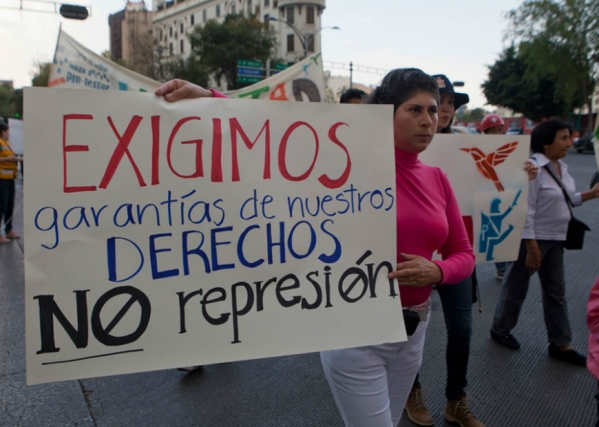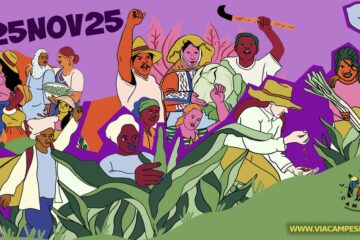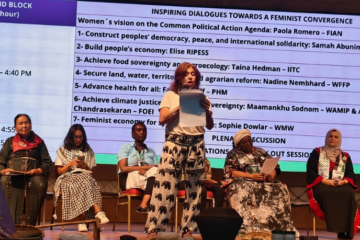For years, the feminist movement has denounced the alliance between authoritarian regimes and capitalist interests, exposing attacks on women’s rights as part of a coordinated strategy. The rise of militarization, the expulsion of communities from their territories, the lack of regulation of corporate power, and environmental crises put at risk not only the rights of peoples and women but also the safety of those who organize to defend them.
Women in movement have played a key role in resisting the brutal offensive against bodies, territories, and democracies. They have emerged as essential voices in contexts marked by systematic persecution and serious violations of international law. In many places, such as Bangladesh and Sri Lanka, women are the ones leading transformative social movements and demanding profound change in their countries, and for this, they face the risks of being on the frontlines. In Bangladesh, student Maliha Namla declared: “It was because of women that this movement became a popular revolution.”
In this same context, women and men students were attacked in their dormitories by members of the Bangladesh Chatrah League, linked to the former prime minister’s party. It is important to note that, in contexts where women are primary targets of violence, they are also the ones playing a central role in responding to crises faced by their communities, as in the Democratic Republic of the Congo and Sudan. Women are subjected to verbal and physical aggression, criminalization, and even murder.
From Myanmar to Kashmir, from Palestine to Colombia, it is women who assume the responsibility of caring for their communities, ensuring access to basic needs, and sustaining the struggle for justice, equality, and peace. Frequently, they face great risks for doing so.
Looking at the Data
According to research by the Irish organization Front Line Defenders, women’s human rights defenders were the most threatened group worldwide in 2024 and the second most threatened in 2023, accounting for 12% of documented violations in 2024 and 10% in 2023.
Organizations and individuals defending women’s rights have been targeted by a range of violations: threats (21.4%), arbitrary detention (19.5%), legal actions (7.6%), interrogations (6.5%), death threats and other forms of intimidation (5.3%). In a global context of setbacks to women’s rights, they remain on the frontlines — and therefore in the line of fire.
The five most documented violations against all human rights defenders were: detention/criminalization, threats, legal actions, death threats, and surveillance. While the proportions of these threats do not differ significantly between women and men, each affects them in particular ways. Notably, surveillance (12.2%) and physical attacks (6.8%) are among the five most documented violations against trans and non-binary people. This data diverges from that for cis women and men, revealing that violence takes on distinct forms depending on sexuality and gender identity.
Looking back, we remember Berta Cáceres, Margarida Alves, Marielle Franco — and so many others we have lost along the way in the struggle. In 2024, according to the HRD Memorial, 43 women were murdered for their human rights defense work. The Memorial is a global collective initiative of 13 human rights organizations committed to protecting defenders and documenting cases of killings.
It is equally important to highlight the gaps in the data. Neither the number of murders nor the documented violations capture the full reality. Documenting such violence consistently is an extremely difficult task in many contexts. Many organizations or individuals who could lead this effort are in exile due to wars or face excessive risks in doing so. In addition, there are severe restrictions on freedom of expression, suppression of information, and restrictions on the right to protest and on civil society’s ability to act.
For women, the situation is even more critical. Their work in human rights defense is often not even recognized as such, rendering invisible the risks they face and the violence to which they are subjected. This lack of recognition leaves violence in the shadows, without protection or security mechanisms. The failure to recognize women as active subjects in the struggle for rights is closely tied to patriarchal structures that divide the public and private spheres. In this gendered division, women are historically associated with the private realm of emotions, family ties, sensitivity, care, and submission, while the public world is associated with citizenship, freedom, rights, property — and men. Family is constructed as belonging to the private sphere, while the state and civil society are located in the public sphere. Women move across both public and private spheres, but their presence in each continues to be marked by separation and hierarchy. This dynamic is mirrored within organizations, where women are often relegated to administrative tasks, or when representing their communities, their interventions are not taken into account.
By separating the space of rights from the private sphere and by hierarchizing the roles of women and men, patriarchy and racism frequently distort the image of women as subjects of human rights defense. Women who, after losing family members, came to lead movements searching for the disappeared in Pakistan, or Indigenous women in Mexico at the forefront of campaigns for the release of their loved ones from prison, have traveled a long road to have their work recognized beyond the roles of wife, daughter, or mother. In crossing the boundaries between public and private, they transform their experiences into demands.
The boldness of women who fight is often met with violence. Attacks against women include not only direct assaults but also attacks on their families, online smear campaigns, sexual violence, and threats that put their mental health and well-being at risk. In retaliation for their leadership role in the Civil Disobedience Movement following the coup in Myanmar, women were subjected to discriminatory practices, including public humiliation, verbal and sexual abuse by police and armed forces.
In addition to facing risks when acting publicly in struggles for equality and rights, women are often used as instruments to threaten their relatives engaged in rights defense. This dimension is often undocumented or even overlooked. In at least nine killings in 2024, family members were also targeted in the same attack, and in another 36 cases relatives or friends were injured. In 2023, 21 relatives of human rights defenders were killed, including children in Afghanistan, Colombia, Honduras, Sudan, and the Philippines.
When Rights Become Crimes
In recent years, we have witnessed an alarming rise in legislation that turns the defense of rights into a punishable act. Laws that should protect dignity and freedom are being weaponized to restrict them. Their impacts on groups defending women’s rights are direct and profound.
In March 2023, Uganda passed the Anti-Homosexuality Act, one of the world’s harshest laws against LGBTQIA+ people. Similar bills are under consideration in Kenya and Ghana, while Malawi, Mali, and Tanzania have already passed laws criminalizing same-sex relations, as well as targeting activists and organizations defending LGBTQIA+ communities. By offering legal, psychological, or even visibility support to persecuted people, women defenders are branded as accomplices and, often, criminals. Similarly, in Lebanon in August 2023, lawmakers introduced bills seeking to criminalize same-sex relations, deepening the climate of repression. In November 2023, Russia’s Supreme Court classified the international LGBT movement as an extremist organization, banning its activities and criminalizing any form of support. The decision legalized already systematic persecution and subsumed people and groups who merely defend the right to exist and to live with dignity under the logic of ‘counterterrorism.
In the context of Israel’s genocide against Gaza, the Israeli parliament recently debated the so-called “ICC Law,” which proposes criminalizing any cooperation with the International Criminal Court (ICC). The bill foresees up to five years in prison for sharing information with the ICC without authorization, and life imprisonment if the data is deemed classified. The law also criminalizes any language suggesting that the Israeli government or authorities commit crimes defined by the Rome Statute. In practice, Israeli-registered human rights organizations that investigate and denounce violations against the Palestinian people could be punished with a minimum of five years in prison. This law is part of a broader pattern of weakening civil society efforts to end genocide and occupation/apartheid regimes. It arises at a time when Israel is seeking to contest the jurisdiction of international courts that have issued arrest warrants against Israeli authorities for war crimes and crimes against humanity, and that continue to document the crime of genocide against the Palestinian people.
Over the past 15 years, Israel’s government has carried out smear campaigns, intimidation, legal restrictions, and pressure on international donors to stifle organizations that expose abuses and strengthen the Palestinian social fabric. An example was the 2020 designation of seven Palestinian organizations as terrorist groups, including UPWC, part of the World March of Women, and UAWC, part of La Vía Campesina. This autocratic measure was followed by a series of other aggressions, including arrests and office closures.
These laws are part of a global trend of repression against civil society, driven by nationalist, religious, or security discourses. Under the pretext of combating “terrorism,” protecting the “family,” or preserving “sovereignty,” states are passing measures that restrict the work of independent organizations and silence dissenting voices. These concepts are invoked at the convenience of governments, corporations, or fundamentalist groups unwilling to regulate profits, tolerate dissent, expand the rights of women, migrants, and LGBTQIA+ communities, or uphold the right to self-determination.
Even the European Commission, in 2023, proposed a Directive on Transparency in Interest Representation on Behalf of Third Countries. While presented as a tool to prevent foreign interference, civil society organizations warn that it could be used by EU member states to stigmatize human rights defenders, shrink civic space, and justify repressive legislation in other contexts — providing a legal façade for authoritarian regimes to imitate the European model under the pretext of “transparency.”
These legal changes create a context in which women engaged in the struggle for rights and in solidarity movements are treated as threats to order. Their actions — organizing a protest, offering legal aid, or even speaking publicly about violations — can be criminalized. The result is the silencing of dissenting voices, the fragmentation of movements, and heightened personal risk for those who continue resisting.
Strategies from Feminism
The recognized importance of social movements in creating new interpretive frameworks — “frameworks of injustice” — contends with other social forces for the dominant definition of reality. Within feminist networks, such frameworks are gradually elaborated, offering new ways of understanding long-standing realities such as patriarchal violence. Feminist scholars such as Ana de Miguel argue that the root of violence against women lies in the need to control, appropriate, and exploit women’s bodies, lives, and sexuality — a logic inherent to patriarchy and capitalism. Patriarchy relies on dividing women into two categories: “saints” and “whores.” As part of this system, violence is the punishment for those who do not fit the role of “saint”: good mother and wife. Violence, the threat of violence, or the fear of violence are used to exclude women from the public sphere and to preserve an unjust structure.
Alongside deploying a system of violence against women at the forefront of struggles for rights, patriarchy also erects barriers that hinder women from accessing the few protection options available to mitigate these risks. We therefore propose a question for future reflection: how can our feminist strategies against violence contribute to safer collective action?
There are important discussions, such as those presented by Jules Falquet in Pax neoliberalia, which draw parallels between politically motivated torture and domestic violence. Feminism’s long trajectory of thinking through and developing strategies to respond to violence more broadly remains a key contribution to discussions and strategies for protecting human rights defenders. Women’s groups strengthen themselves through dialogues, debates, demonstrations, self-defense practices, learning and relearning how to resist, to build and rebuild our lives without violence. We propose a second question for future reflection: how does feminism participate in a network of care and security for diverse movements and collectives?
Reflecting on the violence against women at the forefront of struggles in a global context of backlash and repression. Deepening collective feminist strategies of safety and protection. Seeing ourselves as part of a transnational movement of solidarity. These are central to our collective commitments to building a sustainable feminism.




